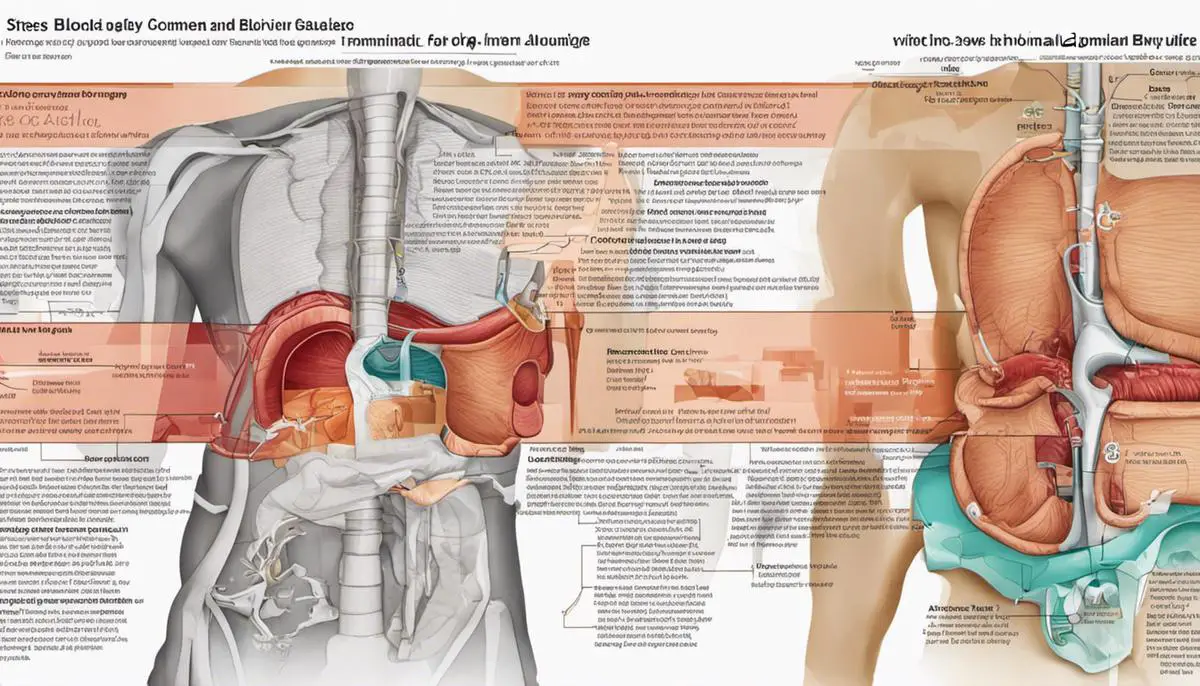With our modern, fast-paced lives, stress is an almost inevitable part of the human experience. While many of us understand that stress affects our state of mind, fewer realize its capacity to disrupt our physical health. Specifically, how it influences our digestive functionality resulting into abdominal bloating. Furthermore, this is not just about feeling ‘stuffed’; it’s about how your body processes your daily experiences and alimentation. It’s time to delve into understanding stress and its causes, exploring abdominal bloating, its typical provokers, and the fascinating yet complex relationship between the two.
Understanding Stress: Causes and Impact
Understanding Stress: What is it?
Stress, a psychological and physiological response to life’s demands and challenges, occurs when an individual perceives that the demands of an external situation are beyond their perceived ability to cope. Stress is an inevitable aspect of life and can stem from several varying triggers, such as work, relationships, obligations, or unexpected changes.
Stress can be categorized as acute or chronic.
Acute stress is a short-term condition that occurs due to events, demands, or pressures in the recent past or near future, whereas chronic stress is long-lasting and can be damaging to the body over time. It’s considered the most harmful form of stress because it’s constant and persists over an extended period.
Stress Response: Fight-or-Flight
When faced with a stressful situation, the body responds by triggering an automatic process known as the “fight-or-flight” response. This response is a survival mechanism that prepares the body to either confront or flee from potential harm. The body’s reaction involves a series of chemical reactions that enhance the body’s ability to face the perceived threat. This includes an increased heart rate, elevated blood pressure, and an increase in the secretion of stress hormones like adrenaline and cortisol.
Effects of Long-term Stress
Continuous exposure to stress not only disturbs emotional wellbeing but also poses serious risks to physical health. Chronic stress can lead to conditions like heart disease, high blood pressure, diabetes, and other illnesses, including mental disorders like depression or anxiety.
Stress and Abdominal Bloating
Interestingly, stress plays a significant role in triggering abdominal bloating. When the body is under stress, its fight-or-flight response can significantly affect the digestive system. This occurs because the body has directed most of its resources towards handling the perceived threat, leaving little energy left for digesting food. This can lead to a slowing down of digestion, causing the production of gas and bloating.
Moreover, chronic stress can affect gut health. It can alter the balance of bacteria in our gut, leading to bloating and discomfort. High stress levels can also increase fluid retention in the body, contributing to bloating. Additionally, individuals under stress may indulge in certain coping behaviors such as overeating, poor dietary choices, or eating quickly, which can result in abdominal discomfort and further bloating.
Learning about the relationship between stress and abdominal bloating is crucial for managing these issues effectively.
Some effective strategies might involve implementing stress management routines such as meditation or relaxation exercises, making adjustments to your diet to reduce bloating, or seeking professional guidance when necessary.

Abdominal Bloating: What it is and usual causes
Defining Abdominal Bloating
Abdominal bloating refers to a sensation of fullness and tightness in the abdomen, often accompanied by visible swelling or distension. This discomfort usually stems from the build-up of gas, fluid or food in the stomach, causing a troublesome, and sometimes painful, sensation of being overfilled or ‘bloated’.
Usual Causes of Abdominal Bloating
There are various causes of abdominal bloating. One common cause is overeating. Consuming large quantities of food, especially high-fiber foods like fruits, vegetables, and whole grains can lead to bloating. The excess fiber can cause gas to build up in the stomach and intestines, causing bloating and discomfort.
Swallowing excess air can also lead to abdominal bloating. This can happen when eating or drinking too quickly, chewing gum, smoking, or drinking carbonated beverages. The swallowed air gets trapped in the digestive tract leading to gas and bloating.
Certain types of foods and drinks are also linked to abdominal bloating. These include beans, onions, broccoli, cabbage, and carbonated drinks. These are known as gas-producing foods. They contain certain types of carbohydrates that are hard for some people to digest, leading to the production of excess gas.
Abdominal Bloating and Stress
Stress can also contribute to abdominal bloating. When we are stressed, our body reacts by releasing stress hormones like adrenaline and cortisol. These hormones slow down digestion, leading to a build-up of gas and fluids in the gut.
Furthermore, stress can lead to a condition known as ‘functional dyspepsia’ or ‘upset stomach’. This condition is characterized by having a sensation of bloating even after a small meal, early fullness, stomach gnawing, and sometimes, abdominal pain. In stressful situations, there’s an extreme sensitivity of the gut, resulting in the symptoms associated with functional dyspepsia.
If stress is the suspected cause of bloating, it’s important to find ways to reduce stress levels. This can involve relaxation techniques like deep breathing, meditation, yoga, or better time management. But it’s also crucial to consult with a healthcare provider who can suggest treatment approaches and interventions specific to the unique needs of each individual.
Tackling Abdominal Bloating with Medication
When abdominal bloating becomes a persistent issue, lifestyle adjustments such as diet modifications and stress management techniques may not suffice. In such scenarios, it might be necessary to turn to medicinal aids. Simple over-the-counter solutions like antacids, probiotics, and activated charcoal can be effective in alleviating bloating and gas. For stubborn cases, a healthcare professional might recommend prescription drugs, including antibiotics or medications designed to expedite the digestion of food within the stomach. However, it’s crucial to explore these alternatives only after seeking professional medical advice.

How Stress can Cause Abdominal Bloating
Fathom the Connection Between Stress and Abdominal Bloating
In today’s rapidly changing world, stress is an inseparable part of our day-to-day lives. However, it’s crucial to understand that ongoing stress can manifest in numerous physical symptoms, one of which could be abdominal bloating. The brain and the gut communicate extensively via a biochemical signaling pathway called the gut-brain axis. This linkage connects our central nervous system to the enteric or gut-focused nervous system. When stress interferes with this interaction, the digestive process can be affected, which may result in abdominal bloating.
Stress and the Digestive Process
When a person experiences stress, their body responds by releasing hormones such as adrenaline and cortisol as a part of the “fight or flight response”. This not only diverts energy away from non-emergency bodily functions like digestion, but can also alter gut motility, slow down transit time, and increase gas production. The result can be digestive disturbances like bloating and pain.
Medical Research on the Stress-Bloating Connection
There is a significant body of medical research supporting the link between stress and abdominal bloating. A study in the American Journal of Gastroenterology found that participants with high self-reported stress levels experienced more bloating than those with lower stress levels. Another study published in the World Journal of Gastroenterology established a link between chronic stress and functional gastrointestinal disorders, including irritable bowel syndrome (IBS), a condition often marked by severe bloating.
Psychosocial Stress and Irritable Bowel Syndrome (IBS)
IBS is among the most common gastrointestinal disorders and is strongly linked to stress. People with IBS often report that stress induces or exacerbates their symptoms, including bloating. The idea is that stress can lead to dysregulation between the brain and gut, promoting inflammation and heightening pain perceptions, which could make someone more sensitive to gas buildup in the gut and thus experience more bloating.
Stress Management: A Way to Alleviate Bloating
Given the research showing a strong connection between chronic stress and bloating, stress management techniques have become a crucial part of tackling bloating. Yoga, meditation, and cognitive-behavioral therapy are among the strategies that some people find helpful in managing stress and, by extension, their bloating symptoms.
The Role of Diet and Lifestyle Changes
While addressing stress is an important part of managing bloating, diet and lifestyle adjustments could also be beneficial. Consuming less gas-producing foods, eating smaller meals more frequently, and engaging in regular exercise can make a significant difference. Probiotics and other supplementation may also help by supporting a healthy gut microbiome, which can be negatively affected by stress.
Paving the Way for Future Research on Stress and Bloating
Considerable progress has been made in understanding the link between stress and abdominal bloating, although several aspects are still shrouded in mystery. Future research can shed light on this, including studying biomechanical changes resulting from stress, such as morphological alterations to the gastrointestinal tract. Moreover, a more nuanced understanding of the gut-brain axis can pave the way for more efficient interventions to break the cycle of stress and bloating.

Strategies for Alleviating stress-induced Bloating
A Closer Look at Stress-Induced Bloating
Abdominal bloating, typically characterized by feelings of fullness and tension in the stomach along with an enlarged appearance, is an issue that many confront. Stress frequently serves as a root cause for bloating. It prompts the body to release stress hormones like cortisol and adrenaline, which disrupt normal digestion, subsequently causing bloating and other digestive complications. The body’s defensive response to stress often includes a reduction in digestive activity and a re-routing of blood away from the digestive system, both of which contribute to bloating and other digestive problems.
Dietary Changes
One of the main ways to tackle stress-induced bloating is by making changes to your daily diet. Minimizing intake of gas-producing foods such as beans, lentils, broccoli, onions, and carbonated drinks can reduce bloating. Maintaining a healthy fluid intake is crucial, while avoiding drinks that can lead to dehydration like coffee and alcohol. Probiotics can also promote healthy digestion, as they are beneficial bacteria that can help to prevent bloating.
Exercise
Exercise is crucial not just for your general health but also for management of stress and resultant bloating. Regular physical activity can keep your digestive system running smoothly, preventing constipation and promoting overall digestive health. Additionally, exercise is one of the most effective ways to lower your body’s cortisol levels, reducing stress and potentially mitigating stress-induced bloating.
Stress Management Techniques
Another important strategy for controlling stress-induced bloating includes incorporating stress management techniques into your daily routine. Techniques such as yoga, mindfulness, meditation, deep breathing, and progressive muscle relaxation can reduce stress and improve gastrointestinal symptoms. These techniques not only work to reduce stress levels but also promote enhanced gut motility, decreasing bloating.
Over-The-Counter Remedies
There are several OTC remedies that can help to combat bloating. Antacids can help to neutralize stomach acid, reducing bloating associated with acid reflux. Simethicone-based medications can help to break down gas bubbles, relieving bloating and associated symptoms. Activated charcoal can help to absorb excess gas and reduce bloating and discomfort. Always consult a healthcare professional before starting any new medication.
Seeking Professional Help
If your symptoms persist despite trying out various remedies and techniques, it may be time to consult a professional for help. A healthcare provider can help identify any underlying conditions that might be causing persistent bloating and provide you with a personalized plan to manage your symptoms efficiently. Mental health professionals can also offer support in managing chronic stress, which might be contributing to persistent digestive symptoms.

Photo by towfiqu999999 on Unsplash
The journey through understanding the intersection of stress and abdominal bloating, hopefully, sheds light on a vital aspect of our overall health. Equipping ourselves with knowledge about the causes and impacts of stress, and understanding the condition of abdominal bloating provides a basis to begin addressing challenges with our digestion. The connection between our brains and our bodies is profound and more intricately connected than it appears on the surface. Therefore, It’s crucial to take steps to manage stress levels and practice habits beneficial for optimal digestive health. Remember, achieving good health doesn’t happen overnight, but every step towards understanding your body and its reactions brings you closer to a more satisfying and healthier life.
